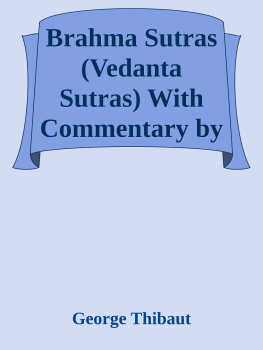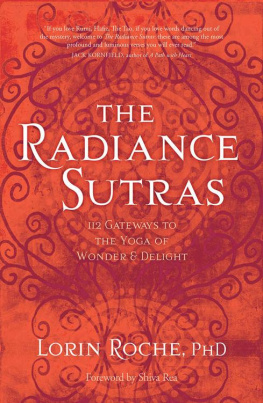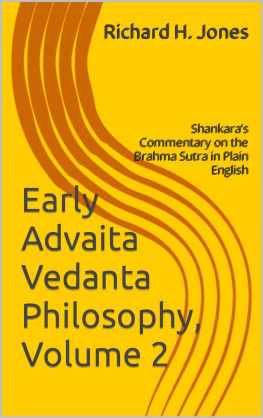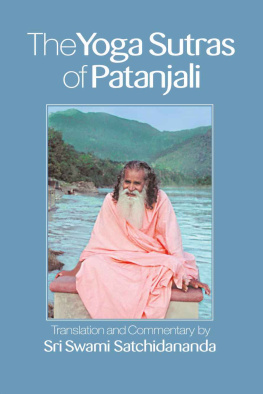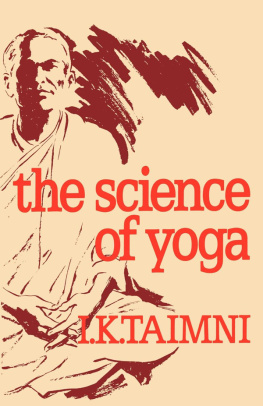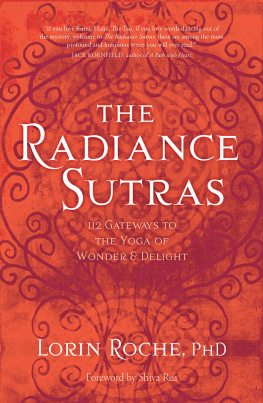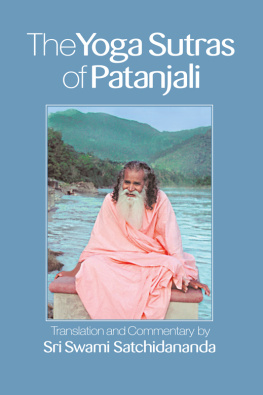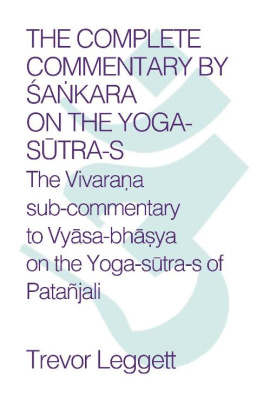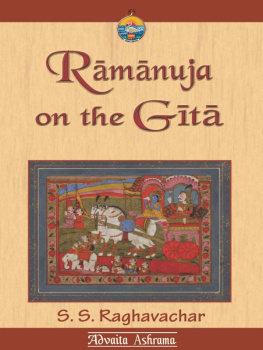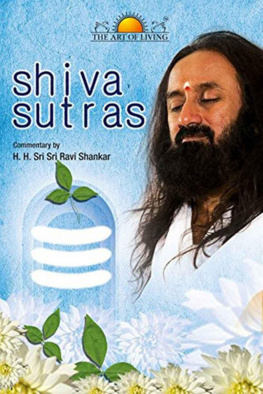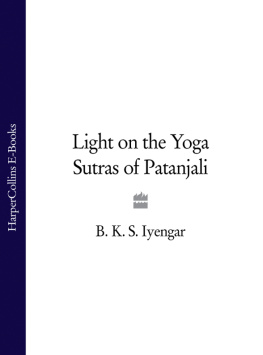The Vedanta-Sutras
With Commentary by Ramanuja
translated by George Thibaut
(Sacred Books of the East, Volume 48)
[1904]
Title PageContentsIntroduction
First Adhyaya
First Pada
First Pada1. Then therefore the enquiry into BrahmanThe Small PurvapakshaThe Small SiddhantaThe Great PurvapakshaThe Great Siddhanta.There is no proof of non-differenced substanceSabda proves differencePratyaksha--even of the nirvikalpaka kind--proves differenceThe bhedabheda view is untenableInference also teaches differencePerception does not reveal mere beingPlurality is not unrealBeing and consciousness are not oneThe true meaning of SvayamprakasatvaConsciousness is not eternalThere is no consciousness without objectConsciousness is capable of changeConsciousness is the attribute of a permanent Conscious selfThe view that the conscious subject is something unreal, due to the ahamkara, cannot be maintainedThe conscious subject persists in deep sleepThe conscious subject persists in the state of releaseIn cases of Scripture conflicting with Perception, Scripture is not stronger. The True cannot be known through the UntrueNo scriptural texts teach a Brahman devoid of all differenceNor do Smriti and Purana teach such a doctrineThe theory of Nescience cannot be provedAll knowledge is of the RealNeither Scripture nor Smriti and Purana teach NescienceScripture does not teach that Release is due to the knowledge of a non-qualified Brahman.--the meaning of 'tat tvam asi.'Summary statement as to the way in which different scriptural texts are to reconciledNescience cannot be terminated by the simple act of cognising Brahman as the universal selfThe Vedantin aiming to ascertain the nature of Brahman from Scripture,...2. Brahman is that from which the origin of this world proceed3. Because Scripture is the source of the knowledge of Brahman4. The connexion of Scripture with the highest aim of man5. Seeing that which is not founded on Scripture...6....the word 'seeing' has a secondary (figurative) meaning7. Because release is taught of him who takes his stand on it8. And because there is no statement of its having to be set aside9. And on account of the contradiction of the initial statement10. On account of (the individual soul) going to the Self11. On account of the uniformity of view12. And because it is directly stated in Scripture13. The Self consisting of Bliss is the highest Self on account of multiplication14. If, on account of its being a word denoting an effect...15. And because he is declared to be the cause of thatra16. And because that (Brahman) which is referred to in the mantra...17. Not the other, on account of impossibility18. And on account of the declaration of difference19. And on account of desire, there is no regard to what is inferred20. And Scripture teaches the joining of this with that21. The one within the sun and the eye...22. And on account of the declaration of difference23. Ether is Brahman...24. For the same reason breath is Brahman25. The light is Brahman...26. If it be objected that Brahman is not denoted...27. And thus also, because thus only the designation of the beings...28. If it be said that Brahman is not recognised...29. Prana is Brahman...30. If it be said that Brahman is not denoted...31. The instruction given by Indra about himself...32. If it be said that Brahman is not meant...
Second Pada
Second Pada1. Everywhere; because there is taught what is known2. And because the qualities meant to be stated are possible in Brahman3. But, on account of impossibility, not the embodied soul4. And because there is (separate) denotation of the object and the agent5. On account of the difference of words6. And on account of Smriti7. Should it be said that the passage does not refer to Brahman...8. Should it be said that there is attainment of fruition...9. The eater is the highest Self on account of there being taken all that is movable and immovable10. And on account of the topic of the whole section11. The two entered into the cave...12. And on account of distinctive qualities13. The Person within the eye is the highest Self...14. And on account of the statement as to abode...15. And on account of the text referring only to what is characterised by pleasure16. For that very reason that ether is Brahman17. And on account of the statement of the way of him who has heard the Upanishads18. Not any other, on account of non-permanency of abode, and of impossibility19. The internal Ruler ... is the highest Self20. And not that which Smriti assumes...21. For both also speak of it as something different22. That which possesses the qualities of invisibility...23. Not the two others, on account of distinction and statement of difference24. And on account of the description of its form25. Vaisvanara is the highest Self...26. That which the text refers to is an inferential mark--thus27. Should it be said that it is not so, on account of the word...28. For the same reasons not the divinity and the element29. Gaimini thinks that there is no objection to the word 'Agni'...30. On account of definiteness; thus Asmarathya opines31. On account of meditation, Badari thinks32. On account of imaginative identification, thus Gaimini thinks...33. Moreover, they record him in that
Third Pada
Third Pada: 1. The abode of heaven, earth is the highest Self...2. And on account of its being declared that to which the released have to resort3. Not that which is inferred...4. On account of the declaration of difference5. On account of the subject-matter6. And on account of abiding and eating7. The bhuman is the highest Self8. And on account of the suitability of the attributes9. The Imperishable is Brahman, on account of its supporting that which is the end of ether10. And this supporting springs from command...11. And on account of the exclusion of what is of another nature than Brahman12. On account of his being designated as the object of seeing, the highest Self is that object13. The small ether is Brahman...14. On account of the going and of the word...15. And on account of there being observed in that small ether...16. And on account of the settled meaning17. If it be said that on account of reference to the other one he is meant; we say no...18.... the soul in so far as its true nature has become manifest19. And the reference has a different meaning20. If it be said, owing to the scriptural declaration of smallness...21. And on account of the imitation of that22. The same is declared by Smriti also23. On account of the term, the one measured24. But with reference to the heart, men being qualified25. Also beings above them, i.e. men...26. If it be said that there results a contradiction to work; we deny this27. If it be said that a contradiction will result with regard to words...28. And for this very reason eternity of the Veda29. And on account of the equality of names and forms there is no contradiction...30. On account of the impossibility of qualification...31. And on account of (meditating on the part of the gods) being in the Light33. That grief of him arose...34. And on account of Ganasruti kshattriya-hood being understood35. On account of the inferential sign further on...36. On account of the reference to ceremonial purifications...37. And on account of the procedure, on the ascertainment of the non-being of that38. And on account of the prohibition of hearing, studying, and performance of (Vedic) matter39. And on account of Smriti40. On account of the trembling41. On account of light being seen42. The ether, on account of the designation of something different, and so on43. On account of difference in deep sleep and departing44. And on account of such words as Lord
Fourth Pada
Fourth Pada: 1. If it be said that some mention that which rests on Inference ...2. But the subtle body, on account of its capability3. Matter in its subtle state subserves an end...4. And on account of there being no statement of its being an object of knowledge5.... the intelligent Self is meant...6. And of three only there is this mention and question7. And as in the case of the 'Great.'8. On account of there being no special characteristic; as in the case of the cup9. But she begins with light; for thus some read in their text10. And on account of the teaching of formation ... there is no contradiction; as in the case of the honey11. Not from the mention of the number even, on account of the diversity and of the excess12. The breath, and so on, on the ground of the complementary passage13. By light, food not being mentioned in the text of some14. And on account of Brahman as described being declared to be the cause with regard to Ether, and so on15. From connexion16. Because it denotes the world17....the inferential marks of the individual soul and the chief vital air18. But Gaimini thinks that it has another purport...19. On account of the connected meaning of the sentences20. It is a mark indicating that the promissory statement is proved...21. Because (the soul) when it will depart is such; thus Audulomi thinks22. On account of Brahman's abiding within the individual soul...23. Brahman is the material cause...24. And on account of the statement of reflection25. And on account of both being directly declared26. On account of the Self making itself27. Owing to modification28. And because it is called the womb29. Herewith all (texts) are explained, explained
Next page
